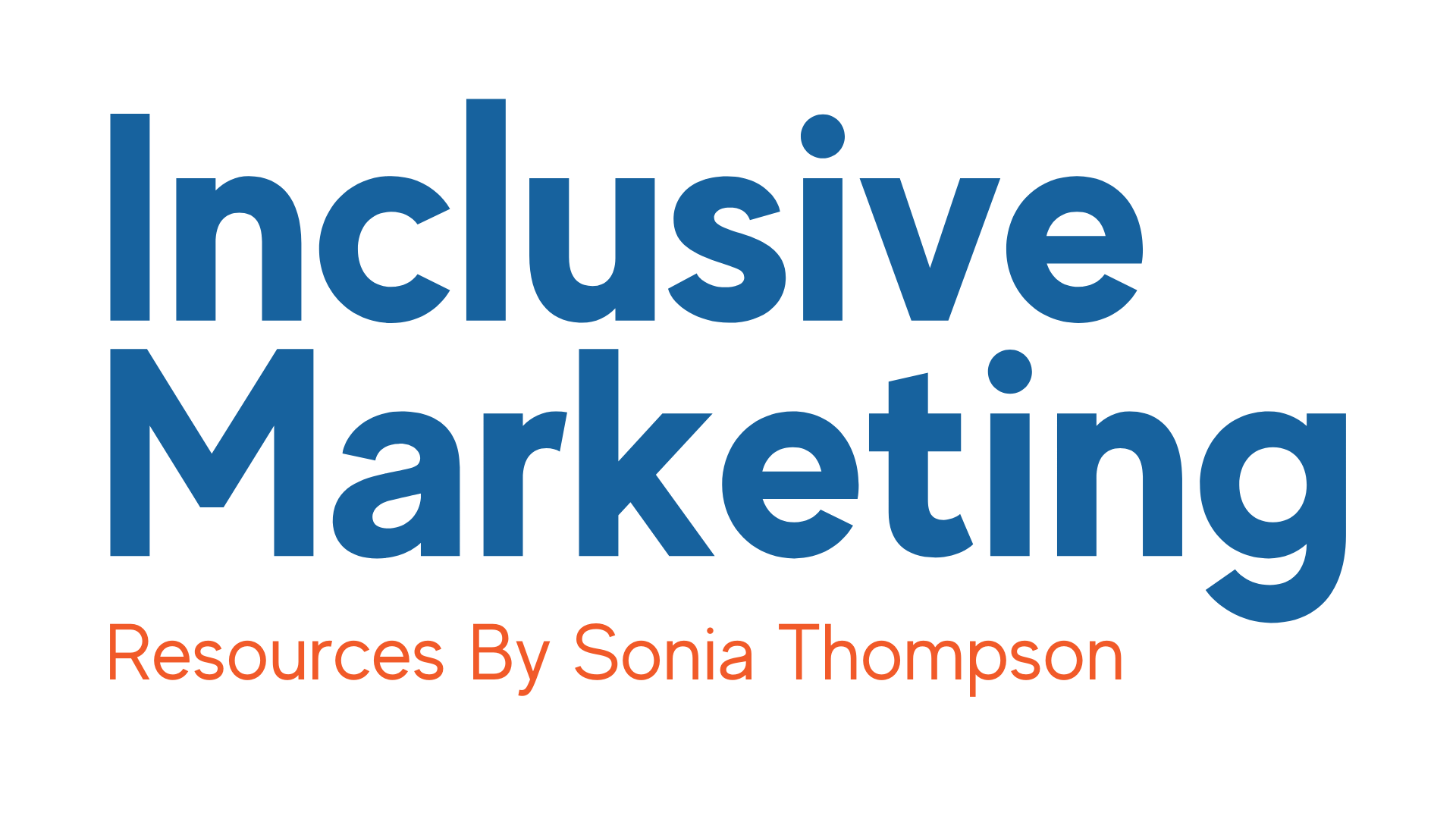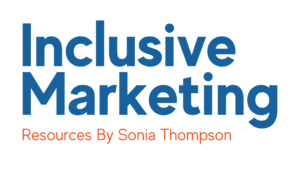Get the episode transcript here
Inclusive marketing is a fairly new discipline. As a result, inclusive marketing consultants and strategists are newer areas of expertise for talent.
Whenever I introduce myself and explain that I’m an inclusive marketing consultant, coach, and strategist, I always find that I need to explain what that means. That includes sharing the ways I support clients for people to get it.
An inclusive marketing consultant isn’t like a copywriter, sales person, or even market researcher where people tend to understand right away more or less what you do.
Thankfully, more brands are focusing on building inclusive brands that attract and retain a bigger and more diverse customer base. As such, I thought it would be helpful to understand how an inclusive marketing consultant can support you in your efforts. This is especially relevant if inclusive marketing isn’t firmly rooted into the DNA of the way your brand operates.
Common Ways Brands Use Inclusive Marketing Consultants
There are a variety of ways an inclusive marketing consultant can help you grow your brand. Here are a few.
Strategy
There are a number of ways inclusive marketing consultants help brands achieve the results they desire from a strategy standpoint.
The point at which you bring a consultant on to assist you, often depends on the degree to which you are already engaging in inclusive marketing. It depends on what your objectives are.
A brand that is just getting started on their journey for inclusive marketing may need help with establishing inclusive values. They also might need to better define who their ideal customer is to ensure the definition isn’t inadvertently excluding people who have identities that are often underrepresented and underserved.
You inclusive marketing consultant could also help you with your overarching strategy. They can help you identify how to make the impact needed on the communities you want to serve. They may also help you in understanding your data, such as what data you need to collect, and how to measure success over time.
If you are a little farther along in you journey with inclusive marketing, you might engage an inclusive marketing consultant to help you with your business planning process. Baking inclusion into business planning will help you tie your efforts in this area directly to business results, with is important for longevity.
Audits
Inclusive marketing audits are often an entry point for brands who want to get going with applying inclusive marketing to what they are already doing.
Having an inclusive marketing consultant conduct an assessment of the current customer experience you’re brand delivers will help you identify areas of opportunity for you both over the short, medium, and long-term.
Depending on how in depth you want to go with your audits, your consultant might also conduct user-testing for you. With user testing, you can get feedback directly from consumers with the specific identities you want to reach. Then you can discover how they receive the experience your brand delivers.
Doing an inclusive marketing audit can help you identify what core areas to focus on in your overarching strategy.
A lot of times marketers are super focused on the campaigns they put together to reach people from underrepresented and underserved communities. They don’t take the time to look at their entire customer journey to see how it measures up. They don’t look for areas of opportunities to reduce friction and improve conversions.
Organizational Readiness
You may not realize this, but much of the work to consistently deliver authentically inclusive marketing happens internally.
If your organization hasn’t tied inclusive marketing to business results, or even your business and strategic planning process, it could be one of the first areas cut if management comes looking for areas to eliminate that aren’t directly positively impacting the bottom line.
If you don’t have systems and processes in place that support your brand in delivering inclusive products, services, communications, and experiences, you will struggle to consistently engage a more diverse customer base.
I’ve worked with clients to help get them ready to show up consistently and authentically for the people they want to serve from underrepresented and underserved communities.
That’s included helping them to develop customer experience vision statement to declare how they want to show up for all their customers. Other times it has been in helping them establish brand values that incorporate an element of diversity, inclusion, and belonging.
And in other instances it was all about helping the team strengthen their systems and processes that support inclusion and belonging in their marketing outputs.
Establishing professional development plans to increase the teams’ degree of cultural intelligence was part of the work with one client. That even included making recommendations for how the team should be held accountable in their individual performance metrics.
There are a ton of layers involved to get your team ready to be an inclusive brand. You and any inclusive marketing consultant you work with will identify what areas are most needed for your team to accomplish your goals over both the short and long-term.
Insights & Cultural Intelligence
To deliver inclusive marketing that is authentic and relevant to the communities you want to serve, it is essential to have the cultural insights needed to speak to your ideal customers in a manner that will resonate with them.
Cultural intelligence is critical to effectively engage with underrepresented and underserved communities. And having a sound understanding of the ways in which the customer journey could be different for people with different identities is essential as well to deliver products, services, experiences, and communications that ensure all the people you serve achieve success at the same rates and feel like they belong with you.
Several clients have hired me as an inclusive marketing consultant to capture insights. The clients want to better understand the journey of specific marginalized communities they want to reach. In most instances that included conducting in-depth one-on-one interviews. And other times that entailed going out and sourcing secondary research to better understand specific communities.
Increasingly, more brands are leaning into inclusive marketing and cultural consultants to enable them to produce better work.
Here’s one example, where you’re probably familiar with the output, but not the role consultants played in achieving those outcomes.
How Disney Used Cultural consultants to save ‘Coco’
Disney’s Pixar initially had a lot of trouble with the film we now know as the Academy Award winning film CoCo. One of the first things they did wrong was try to trademark “Dia de los Muertos” and “Day of the Dead” (the original name of the movie). Many people, particularly from the Latino community called the entertainment giant out for cultural appropriation.
Eventually Disney withdrew the patent amidst the backlash. Lee Unrich, the film’s co-director talked about the pressure he felt to get the film right.
“The last thing that I wanted to do was to make a film that felt like it was made by an outsider. I mean, I’m not Latino and I never will be Latino. I just can’t change that. But I comforted myself in knowing that there had been a lot of great films made over time by filmmakers that were not of the cultures that they made films about, so I took the responsibility very serious and I have for many years. It has been great having Adrian [Molina] by my side and all of the cultural consultants that we’ve gathered and the many Latino members of our crew that have been a part of this for a long time and I hope that we’ve got it right.
The Coco team hired cultural consultants to guide them and as one critic commented “to fix the mistakes that they made.” Unrich shared that those cultural consultants played a major role into shaping the film.
“We were constantly meeting with cultural advisors and learning more about the celebration, learning more about the traditions. All of that to continue to inform and to guide us to the story that we ultimately told.“
Reviews & Approvals
I first heard of this a couple of years ago from a colleague . She told me that her company had implemented a new rule that all marketing materials needed to get sign-off from the diversity and inclusion office before going out the door.
I remember my eyes getting super big when I heard that. It seemed like not only a major bottleneck. Also problematic was having a non-marketing person review marketing materials to establish whether or not they were acceptable.
Now of course I know, there will be times where other people not in marketing need to weigh in. Lots of companies have Legal team give guidance on certain materials. When I worked at J&J we always had Clinical and Regulatory sign off on all of our materials as well.
Checks and balances are good.
I have an issue with having materials go for approval in the diversity department. Having the diversity team review just seems like one other thing to “dump” on them. It feels like a “crisis prevention” measure. The objective is to ensure nothing super offensive goes out the door that was going to get the brand cancelled.
It also feels unfair to all involved. Thinking about diversity, equity, inclusion, and belonging from an organizational standpoint, is not the same as evaluating whether or not something is ok in marketing. The competencies are different.
Then I heard from another client that from time to time they send materials to their DE&I team. So I wanted to sit and understand more what was at the heart of this action.
It feels like a bandaid fix to a bigger issue: an unequipped marketing team (and processes).
Ultimately, the marketing team does not have the cultural intelligence or sufficient customer intimacy needed internally as a competency to take on this important function within their own department.
That’s also something an inclusive marketing consultant will help you with, but I’ll cover that in another section.
All those thoughts were top of mind for me when a client came and asked if I could serve this function for them. So now, part of how I support this client is by being their inclusive marketing reviewer on their materials.
Now, this doesn’t include every single piece of content or campaign that goes out the door. I created a guidance document for them to identify when items should come to me for review.
And when I do send things back to them, my process isn’t just to give them the thumbs up or thumbs down on the project. It is to educate them along the way so that over time they can develop this competency for themselves in-house, and won’t need me, or another inclusive marketing consultant to do this for them. They’ll have the competency within their own team to do it themselves.
Campaign development
A while back a client brought me on as an inclusive marketing consultant to work on their African-American engagement strategy.
They knew they weren’t performing as well as they should have been with this customer group. And hey needed to not only understand why, but also figure out what to do about it.
So I went to work. I discovered some issues that needed to be addressed. Next, I came up with some campaigns that were relevant to both the community and the brand.
CoorDown is a non-profit organization that supports the advancement of people with Down Syndrome. Leading up to World Down Syndrome Day every year, the brand releases a new campaign. Their goal is to brings awareness to how to better support people with Down Syndrome living their best life.
Their latest campaign went viral.
As I dug into the making of the campaign, I discovered that people with Down Syndrome were heavily involved in the development process. In essence, they were brought on as co-creators. That enabled the team to bring forth a powerful and authentic campaign that was transformational for a lot of people.
Training
I’ve lost count of the number of training sessions I’ve conducted on inclusive marketing. Workshops, keynotes, and other types of training can be useful to give your teams a primer on what they need to know.
And when your team is ready, advanced topics are also an avenue.
Investing in your team’s professional development, no matter the format will pay dividends. An inclusive marketing consultant can support you with a training program to give your team the skills they need to be successful. Just choose a format which works best for your team, and a partner who can deliver on it.
Common formats include on-demand virtual sessions, live workshops, and even custom training solutions.
Coaching
Not enough brands are doing this, but coaching can really help marketing teams advance when it comes to inclusive marketing.
Fear, lack of competency and confidence are major reasons a lot of brands haven’t gotten started with inclusive marketing. For others, those same reasons have prevented them from engaging in inclusive marketing at a deeper level.
A lot of brands will sign their teams up for training, which is important. But how many times have you gone through a training session that was really useful, and then promptly went back to operating the way you always did?
Training has no real value if you don’t put what you learn into practice.
Application is how you build confidence. Application is how you build know-how. It is in the application of learned principles that fear begins to wane.
And the process of doing inclusive marketing is where the questions most often pop-up.
Questions are a natural part of the learning process. And at times uncertainty comes along because marketing inclusively can sometimes feel like there are a lot of grey areas.
Having a coach in your back pocket who can provide guidance, support, and answer questions along the way is helpful.
I’ve worked with marketing teams and business owners to coach them behind the scenes. We focus on how to develop inclusive marketing and an inclusion-based mindset into the way their brand operates.
That often looks like regular meetings with the teams. The cadence could be once or even twice a month to talk through present projects and challenges. The coaching process should enable you to chart a path to achieve a goal.
Support might also look like attending office hours sessions to ask questions. This could be live during a pre-set video session, or within a Slack channel for instance.
Find the cadence that works for you and the consultant you choose.
Which Type of Inclusive Marketing Consultant Is Right For You?
Like with many things, there are various types of inclusive marketing consultants you could work with. Here are a few:
Identity-based consultant
Some inclusive marketing consultants focus their efforts solely on one identity of consumer. The identity they focus on, is often an identity that they hold.
Let’s say you want to ensure people in the LGBTQ+ community feel like they belong with you.
That may mean working with an LGBTQ+ inclusive marketing strategist to support you in your efforts.
This type of consultant can help you ensure you’re addressing the needs of the specific community you want to serve throughout your marketing mix.
Cultural consultant
A cultural consultant is someone to bring on to help you specifically understand aspects and nuances of a particular culture.
They will give you and your team lots of cultural intelligence and insight on what is authentic to the specific community you’re trying to reach.
Lalo Alcaraz is a cultural consultant who’s worked for brands like Disney And Nickelodeon. He described his role on the Nickelodeon show “Casagrandes” as “reviewing scripts, making suggestions about language, and monitoring Spanish pronunciations in recordings.”
Many cultural consultants focus strictly on ensuring aspects of what a brand does with regard to a culture is authentic. In a lot of instances, they aren’t engaged in larger conversations arounds strategy, organizational readiness, or even training.
General consultant
The last category I want to highlight are inclusive marketing consultants that are generalists. They don’t necessarily specialize on one particular identity, or specific area of the marketing mix.
General inclusive marketing consultants often can support you in various aspects of your organization. They can often can provide support in a number of areas listed in the previous section.
How To Know If Your Brand Needs An Inclusive Marketing Consultant?
Ask yourself these simple questions to help identify if working with an inclusive marketing consultant is right for your brand:
- Can your brand go out and confidently execute a campaign that speaks to an underrepresented and underserved community?
- Does your team know how to deliver experiences that ensure all of the people you serve feel like they belong with you? Do all of your customers, no matter their identity, achieve success at the same rates?
- Do you have a customer-base that is representative of all the types of people who have the problem your brand solves?
- Is your organization equipped to consistently deliver inclusive marketing throughout all areas of your marketing mix?
- Do you and your team know if areas of the current customer experience you’re delivering sends signals to your ideal customers from underrepresented and underserved communities that “you don’t belong here”?
Did you answer yes to any one of these questions? If so, your brand could benefit from working with an inclusive marketing consultant in one or several of the ways mentioned above.
Ready to Work With An Inclusive Marketing Consultant?
If your team and your business need it, don’t hesitate to invest in it. Inclusive marketing is the future of marketing.
Be sure you give your team the best chance to succeed. Give them the support they need to achieve the impact and business results you desire for your brand.
Find a consultant you trust and like.
Then reach out and identify the right approach and mechanisms for which they can best support you.
I offer a number of the services covered above. Book a call here if you’re ready to chat about how I can support your growth efforts with inclusive marketing.





1 Comment